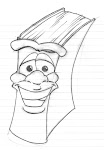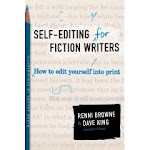Everyone, thank you for all your feedback on the other posts. Now, I hope you'll all dive in on this post. I had set a rule that I wouldn't put up anything longer than give or take 500 words. Well, we're stretching it on this one. The following post is the entire story of a picture book (without the pictures), written by one of my talented critique partners Anita Davison. Anita is from Surrey, England, which you'll notice reflects in her writing.
She's anxious to hear your thoughts, so have at it.
The Beach
Rhys bounded down the front steps of the cottage two at a time.
“Don’t go far,” his mother warned. “And stay away from the harbour.”
“Yes Mum,” Rhys called over his shoulder. As he had been told, he paused to look both ways before crossing the road. Once on the other side, he climbed the low sea wall and jumped down onto the sand.
The journey to the coast had been long and hot, so when his Dad’s car pulled up in front of the house, Rhys couldn’t wait to get into the fresh air.
With his hands thrust deep into the pockets of his shorts, his feet scuffed the warm sand. He stopped every few steps to lift each foot in turn to see the grains trickle out, gold and sparkly over his socks.
Fluffy white clouds scudded by in a bright blue sky, while fat seagulls dipped and swooped at bits of discarded picnic on the beach.
The stubby bows of brightly painted fishing boats tied to the quay bobbed and pulled against the ropes. Rhys loved boats. But he had promised he wouldn’t go near the harbour. The water was deep there.
Wet from the outgoing tide, the sand sucked at his feet, his footsteps filling instantly with water at each step. He wanted to tell someone about it, but there was no one there.
Maybe Dad would come with him next time.
Dad. He’d behaved strangely since he came out of the hospital. He spent all his time these days sitting in his armchair, staring out at the garden or nothing at all. He had injured his leg so badly when he crashed the car, Mum said, the doctors had put a metal pin inside. Rhys imagined that must hurt a lot. No wonder Dad was unhappy.
To give his father’s leg time to heal, they were to spend the whole summer in the narrow house with blue shutters that overlooked the bay.
At first, Rhys had been upset at the thought of going away for so long. Would his friends at home forget him? His gaze flicked over the line of houses strung along the base of the cliff, wondering if any children his age lived there.
An orange sun dipped into the sea, and a line of frothy white waves curled and fell in the distance. A boat with white sails skimmed across the bay.
Around him, grown ups sat on beach towels, sleeping. Children played in the sand with buckets and spades, or ran in and out of the surf while a little black dog barked at them.
Piles of stones seemed to be jumbled together at the base of the cliff, some twice as high as Rhys himself. Staggered, like steps, their edges had been rubbed smooth by the waves.
Rhys liked climbing, so he pulled himself up to the top of a section to where a large flat rock rested on the top.
It wasn’t high enough to worry Mum, but he had a good view of the tops of people’s heads as they passed below. The middle was filled with water so clear, Rhys could see right the way down to the sand on the bottom. It was a rock pool.
Bigger than a bath, but not quite as big as a paddling pool, the water sparkled in the late afternoon sun. The layer of sand at the bottom seemed magnified, almost fluffy; its surface scattered with shells and tiny black pebbles.
Taking off his shoes, Rhys lay on his tummy and wriggled to the edge. The sun was warm on his back as he stared into the water, his nose a few inches above the surface and his hands shielding his eyes. “I like it here,” he murmured aloud.
Seagulls screeched over head, and off in the distance, the waves whooshed and sighed on the beach. The smell of seaweed drying in the sun smelled sharp on the breeze.
Rhys grew sleepy lying there and closed his eyes for a second. He didn’t mean to fall asleep, but when a seagull screeched close by, he woke with a start.
The car park was almost empty, and the beach was almost deserted but for a man walking his dog by the shoreline. Two children ran towards the car park, trailing sand-caked spades behind them. Then Rhys heard a familiar voice and turned to look at the house with the blue shutters.
His mother stood at the door, waving. “Your tea’s ready, Rhys.”
Rhys grinned. “Oh, good. I’m starving.” He searched around for his shoes and spotted them half concealed between two rocks. As he leaned forward to retrieve them, he sensed something move in the water below.
He froze. A face stared up at him from the bottom of the pool. A face with flowing blue hair and round green eyes.
“Rhys, I can’t wait here all day, come on now!” his mother called again.
Rhys looked up, nodded and waved. “I’m coming, Mum!”
He grabbed his shoes, then turned back to the pool. It was empty.
Tuesday, October 27, 2009
Subscribe to:
Post Comments (Atom)












Just like everything Anita writes, she moved me right into story and allowed me to experience the ocean, sand, and sun with Rhys. I'm a devoted fan, and with or without pictures, this is a lovely read.
ReplyDeleteI'm already a fan of Anita's lovely writing.
ReplyDeleteThis shows more of her vast talent.
Beautiful.
Hi, Anita! I'm not a normal CP and not familiar with what's expected of British picture books, but I do know what's expected of American pbs. There are 36 pages (yes, there are exceptions of shorter and longer books, but they cost more to produce and are unlikely to be picked up because of it.)and all descriptions are told by the artwork. Also, American publishers don't want to see too many illustrator's notes from the author because our illustrators want to have a say in what they draw. All of that means your lovely descriptions would move your book out of the picture book world, which I think the age of your narrative and the length has already done. This seems more like a chapter book, to me. That said, I do NOT know squat about how the Brits do picture books, so keep that in mind! ;D
ReplyDeleteHi Anita,I love your writing. I write picture books too and it is hard for me to leave out all the descriptions, but for a picture book you need to leave that for the illustrator.
ReplyDeleteThe descriptive sections should be left out, along with the section about his father being in the hospital, it doesn't seem to have anything to do with the story. You need to add to the plot, have a conflict or obstacle for him to overcome and show what he does to overcome it. I think it is a nice story and very illustratable. You just need to tighten it and add to the plot.
I don't know anything about picture book rules. I understand the point of leaving the descriptions to the illustrator but . . . this feels like something that would be a beautiful book to read to a child when they are younger. Then, later they would enjoy the beauty of the words themselves. The description is wonderful. I think it would make a child fall in love with prose. Or maybe I just think that because I also did/still do.
ReplyDeletethanks Anita for sharing it.
Thank you all for such nice comments, and with all credit to Sandi for being kind enough to post my story. There are ten in total about Rhys and the Sandelves he finds in the world below the rock pools. I would like them to be illustrated, however they are really reading books aimed at the 6-10 year age group.
ReplyDeleteGosh, I wish I could write like this. It just doesn't seem to get out of my head and onto the paper the same. Well done!
ReplyDeleteThanks for dropping by, Crystal Mary. With lots of practice, you can write something like this. Only difference is, it will be in your own voice and your own unique story. :-) Keep at it!
ReplyDeleteThank yyou for sharing this
ReplyDelete